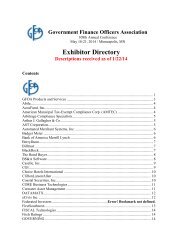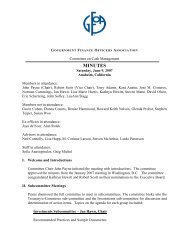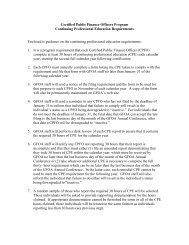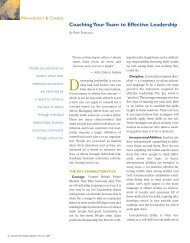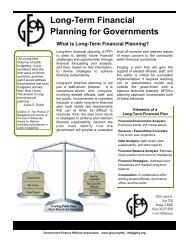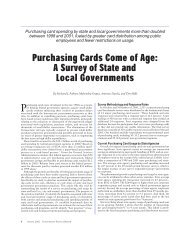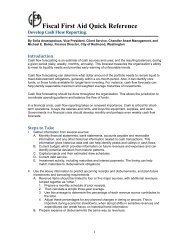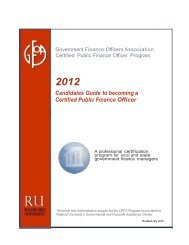Fees Charged in a Bond Transaction - Government Finance Officers ...
Fees Charged in a Bond Transaction - Government Finance Officers ...
Fees Charged in a Bond Transaction - Government Finance Officers ...
You also want an ePaper? Increase the reach of your titles
YUMPU automatically turns print PDFs into web optimized ePapers that Google loves.
BEST PRACTICE – DRAFT 2/3<br />
Costs of Issuance Incurred <strong>in</strong> a Publicly Offered Debt <strong>Transaction</strong> (2013)<br />
Background. State and local governments <strong>in</strong>cur various costs and fees <strong>in</strong> conjunction with publicly offered bond<br />
transactions. This Best Practice provides an overview of the types of costs and fees that an issuer can expect to<br />
pay <strong>in</strong> a typical bond transaction. F<strong>in</strong>ance officers need to be aware of and understand the costs and fees that are<br />
charged <strong>in</strong> a bond transaction <strong>in</strong> order to ensure that the charges are reasonable and for legitimate services<br />
provided to the issuer.<br />
There are two types of costs that issuers <strong>in</strong>cur <strong>in</strong> the debt issuance process:<br />
Direct Costs of Issuance: Costs that the debt issuer pays directly to f<strong>in</strong>ancial and legal advisors, the<br />
trustee (if any), pay<strong>in</strong>g agents, auditors, rat<strong>in</strong>g agencies and other providers of services to the issuer.<br />
Underwriters Discount: Costs paid <strong>in</strong>directly by the issuer to the underwriter of the bonds for services<br />
relat<strong>in</strong>g to sell<strong>in</strong>g the bonds to <strong>in</strong>vestors and manag<strong>in</strong>g elements of the transaction. These costs are deducted from<br />
the proceeds of the bonds by the underwriters at clos<strong>in</strong>g and therefore issuers typically do not “write a check” for<br />
these services.<br />
F<strong>in</strong>ance officers should also be aware that certa<strong>in</strong> costs are embedded with<strong>in</strong> the bids received from underwriters<br />
<strong>in</strong> a competitive sale. These costs and fees are typically not specified <strong>in</strong> a competitive bid and are outside of the<br />
issuer’s control. Such costs <strong>in</strong>clude CUSIP fees, DTC fees and certa<strong>in</strong> <strong>in</strong>ternal expenses of the bidder.<br />
This Best Practice focuses on direct costs of issuance. Best Practices relat<strong>in</strong>g to costs paid by issuers through the<br />
underwriter’s discount may be found <strong>in</strong> the follow<strong>in</strong>g Best Practices:<br />
<br />
<br />
Select<strong>in</strong>g Underwriters for Negotiated <strong>Bond</strong> Sales<br />
Expenses <strong>Charged</strong> by Underwriters <strong>in</strong> Negotiated Sales<br />
F<strong>in</strong>ance officers, work<strong>in</strong>g through their f<strong>in</strong>ancial advisor, should understand all costs and fees up front, so that<br />
they can be controlled and managed throughout the issuance process. A thorough discussion with your f<strong>in</strong>ancial<br />
advisor and other professionals <strong>in</strong>volved <strong>in</strong> the transaction should be expected. These discussions should occur at<br />
the time that compensation is be<strong>in</strong>g determ<strong>in</strong>ed for key members of the f<strong>in</strong>anc<strong>in</strong>g team, <strong>in</strong>clud<strong>in</strong>g the f<strong>in</strong>ancial<br />
advisor, bond counsel and other service providers. As always, cost must be balanced with quality, as it is of<br />
critical importance that the issuer receives high quality services and work products from all parties.<br />
Recommendation. Typical bond transactions <strong>in</strong>volve selection and management of several key professionals as<br />
described below. The <strong>Government</strong> F<strong>in</strong>ance <strong>Officers</strong> Association (GFOA) recommends that f<strong>in</strong>ance officers be<br />
aware of the parties likely to be <strong>in</strong>volved <strong>in</strong> the transactions and be prepared to select these parties <strong>in</strong> a manner<br />
that ensures that needed services are obta<strong>in</strong>ed at a fair and reasonable cost. In order to achieve these goals, GFOA<br />
recommends that f<strong>in</strong>anc<strong>in</strong>g team members typically be selected through a Request for Proposals (“RFP”) process.<br />
a. F<strong>in</strong>ancial Advisor. F<strong>in</strong>ancial advisors assist the issuer on matters such as select<strong>in</strong>g the method of sale,<br />
structur<strong>in</strong>g the bonds, sale tim<strong>in</strong>g, market<strong>in</strong>g, pric<strong>in</strong>g fairness, credit rat<strong>in</strong>gs, credit enhancement and<br />
other matters. Unlike the underwriter of the bonds, the f<strong>in</strong>ancial advisor has a fiduciary obligation to<br />
represent the <strong>in</strong>terests of the issuer and therefore, should be one of the first f<strong>in</strong>anc<strong>in</strong>g team members<br />
reta<strong>in</strong>ed by the issuer.
GFOA recommends that f<strong>in</strong>ancial advisors be selected as the result of an RFP process. <strong>Fees</strong> can be paid<br />
on an hourly, $/$1,000 of par value or fixed fee basis. The f<strong>in</strong>ancial advisor should typically be reta<strong>in</strong>ed<br />
prior to selection of the rema<strong>in</strong>der of the f<strong>in</strong>anc<strong>in</strong>g team and should assist the issuer <strong>in</strong> determ<strong>in</strong><strong>in</strong>g the<br />
appropriate method sale, the selection of other members of the f<strong>in</strong>anc<strong>in</strong>g team and the negotiation of fees<br />
of the f<strong>in</strong>anc<strong>in</strong>g team members.<br />
b. <strong>Bond</strong> Counsel. <strong>Bond</strong> counsel’s duty is to represent the <strong>in</strong>terests of the bondholders. <strong>Bond</strong> counsel is<br />
reta<strong>in</strong>ed by the issuer to give a legal op<strong>in</strong>ion that:<br />
i. Issuer is authorized to issue proposed municipal securities and has met all legal and procedural<br />
requirements necessary for issuance<br />
ii. Interest on the proposed securities (tax-exempt bonds) will be excluded from gross <strong>in</strong>come of the<br />
holders (Federal and/or State)<br />
iii. Typically responsible for the preparation of all f<strong>in</strong>anc<strong>in</strong>g documents <strong>in</strong>clud<strong>in</strong>g Trust Indenture<br />
and <strong>Bond</strong> Resolution; assists with preparation of the Official Statement<br />
Compensation paid to bond counsel varies depend<strong>in</strong>g on complexity of the transaction, the type of<br />
security and the type of issuer. These fees can be assessed based on a flat fee, hourly bill<strong>in</strong>g or $/$1,000<br />
of par value of the issuance.<br />
Special Disclosure or Tax Counsel. In addition to bond counsel, some transactions will <strong>in</strong>volve the use of<br />
disclosure counsel and tax counsel.<br />
c. Trustee. A f<strong>in</strong>ancial <strong>in</strong>stitution with trust powers that acts <strong>in</strong> a fiduciary capacity for the benefit of the<br />
bondholders, enforc<strong>in</strong>g the terms of the trust <strong>in</strong>denture and often act<strong>in</strong>g as:<br />
a. Pay<strong>in</strong>g agent (transmitt<strong>in</strong>g payments from issuer to bondholder)<br />
b. Dissem<strong>in</strong>ation agent<br />
c. Escrow agent on refund<strong>in</strong>g transactions (hold funds <strong>in</strong> escrow account until time of disbursement)<br />
Trustee fees frequently <strong>in</strong>clude a one-time upfront fee (acceptance fee) and an annual fee (trusteeship<br />
fee). The selection of the Trustee should be done through an RFP process.<br />
d. Escrow Verification Agent. An escrow verification agent is hired <strong>in</strong> conjunction with a refund<strong>in</strong>g issue.<br />
The role of the escrow verification agent is to determ<strong>in</strong>e that the cash flow from the securities purchased<br />
to defease the refunded bonds will be sufficient to make all rema<strong>in</strong><strong>in</strong>g debt service payments on the<br />
refunded bonds.<br />
e. Auditor. Under audit<strong>in</strong>g standards generally accepted <strong>in</strong> the United States of America, <strong>in</strong>dependent<br />
auditors are presumed not to be associated with f<strong>in</strong>ancial statements <strong>in</strong>cluded <strong>in</strong> an offer<strong>in</strong>g statement.<br />
Still, an “association” may be created between the <strong>in</strong>dependent auditor and the offer<strong>in</strong>g statement if the<br />
auditor takes one of several actions specified <strong>in</strong> the audit<strong>in</strong>g standards, such as <strong>in</strong>sert<strong>in</strong>g a provision <strong>in</strong> the<br />
audit contract that requires prior approval before <strong>in</strong>clud<strong>in</strong>g audited f<strong>in</strong>ancial statements <strong>in</strong> an offer<strong>in</strong>g<br />
statement. It is important to note that the audited f<strong>in</strong>ancial statements belong to the issuer, which GFOA<br />
believes should be free to publish <strong>in</strong> offer<strong>in</strong>g statements. Audit contracts <strong>in</strong> general should be negotiated<br />
to reflect this, but to the extent that consent is required, the level of effort required is m<strong>in</strong>imal and no<br />
additional fee should be required.<br />
f. Rat<strong>in</strong>g Agencies. Rat<strong>in</strong>g agency fee quotes can be obta<strong>in</strong>ed by your f<strong>in</strong>ancial advisor or a member of<br />
your staff. <strong>Fees</strong> vary by bond size and security type. Consideration should be given to how many rat<strong>in</strong>gs<br />
are necessary, through discussion with your f<strong>in</strong>ancial advisor and underwriter.
g. Pr<strong>in</strong>t<strong>in</strong>g and Distribution Costs. Issuers will typically <strong>in</strong>cur costs relat<strong>in</strong>g to electronically post<strong>in</strong>g their<br />
official statement to websites and <strong>in</strong>formation services that potential underwriters and <strong>in</strong>vestors rely upon<br />
to access <strong>in</strong>formation about proposed bond offer<strong>in</strong>gs. In some cases, traditional hard copy pr<strong>in</strong>t<strong>in</strong>g costs<br />
may also be <strong>in</strong>curred.<br />
References<br />
GFOA Best Practice, Expenses <strong>Charged</strong> by Underwriters <strong>in</strong> Negotiated Sales (2012)<br />
GFOA Best Practice, Select<strong>in</strong>g Underwriters for Negotiated <strong>Bond</strong> Sales (2008)<br />
GFOA Best Practice, Pric<strong>in</strong>g <strong>Bond</strong>s <strong>in</strong> a Negotiated Sale (2009).<br />
<br />
GFOA Best Practice, Select<strong>in</strong>g and Manag<strong>in</strong>g the Method of Sale of State and Local <strong>Government</strong> <strong>Bond</strong>s<br />
(2007)<br />
GFOA Best Practice, Select<strong>in</strong>g <strong>Bond</strong> Counsel (2008)<br />
GFOA Best Practice, Select<strong>in</strong>g F<strong>in</strong>ancial Advisors (2008)<br />
GFOA Best Practice, Issuer’s Role <strong>in</strong> Select<strong>in</strong>g Underwriter’s Counsel, 2009.<br />
<br />
GFOA Advisory, Auditor Association with F<strong>in</strong>ancial Statements Included <strong>in</strong> Offer<strong>in</strong>g Statements or<br />
Posted on Web Sites (2006)



